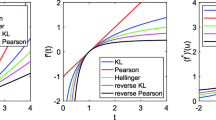Summary
In this article, we first introduce the concept of strong completeness and then show that the mixture of every strongly complete distribution is complete if the mixing distribution is complete. This, in effect, reveals the completeness of several well-known mixtures. For instance, Xekalaki (1983,Ann. Inst. Statist. Math., to appear) showed that the Univariate Generalized Waring Distribution is boundedly complete only relative to one of its three parameters. Now, as a consequence of our result, it follows that this distribution is actually complete relative to any of its parameters.
Self-decomposability of mixtures is also discussed here. It is shown that a mixture of self-decomposable distributions is not necessarily self-decomposable when the mixing distribution is self-decomposable. For a special case of Poisson mixture, however, the result is valid when the mixing distribution is continuous self-decomposable, a result due to Forst (1979,Zeit. Wahrscheinlichkeitsth.,49, 349–352).
Similar content being viewed by others
References
Baxter, G. and Shapiro, J. M. (1960). On bounded infinitely divisible random variables,Sankhyā,17, 253–260.
Chatterjee, S. D. and Pakshirajan, R. P. (1956). On the unboundedness of infinitely divisible laws,Sankhyā,17, 349–350.
Fisz, M. and Varadarajan, V. S. (1963). A condition for the absolute continuity of infinitely divisible distributions,Zeit. Wahrscheinlichkeitsth.,1, 335–339.
Forst, G. (1979) A characterization of self-decomposable probabilities in the halfline,Zeit. Wahrscheinlichkeitsth.,49, 349–352.
Irwin, J. O. (1968). The generalized waring distribution applied to accident theory,J. R. Statist. Soc., A,131, 205–225.
Johnson, N. I. and Kotz, S. (1970).Continuous Univariate Distributions 1, Houghton Mifflin, Boston.
Lehmann, E. L. (1964).Testing Statistical Hypotheses, Wiley, New York.
Ruegg, A. (1970). A characterization of certain infinitely divisible laws,Ann. Math. Statist.,41, 1354–1356.
Sibuya, M. (1979). Generalized hypergeometric, di-gamma and tri-gamma distributions,Ann. Inst. Statist. Math., A,31, 373–390.
Steutel, F. W. and van Harn, K. (1979). Discrete analogues of self-decomposability and stability,Ann. Prob.,7, 894–899.
Xekalaki, E. (1983). Infinite divisibility, completeness and regression properties of the Univariate Generalized Waring Distribution,Ann. Inst. Statist. Math., to appear.
Author information
Authors and Affiliations
About this article
Cite this article
Alamatsaz, M.H. Completeness and self-decomposability of mixtures. Ann Inst Stat Math 35, 355–363 (1983). https://doi.org/10.1007/BF02480991
Received:
Revised:
Published:
Issue Date:
DOI: https://doi.org/10.1007/BF02480991




